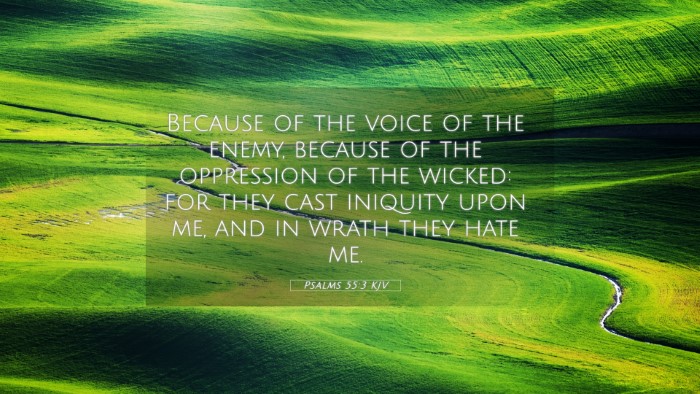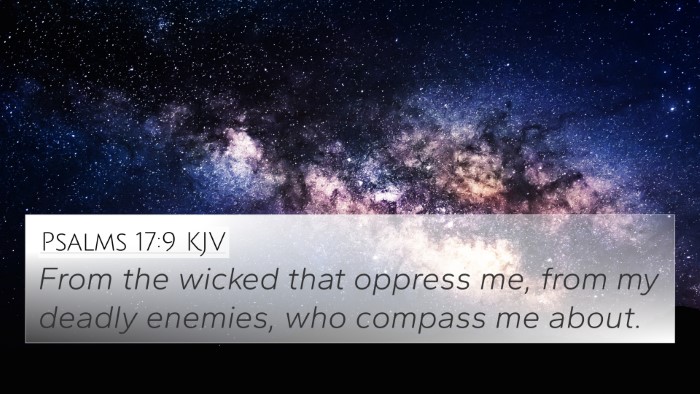Understanding Psalms 55:3
Psalms 55:3 states:
"Because of the voice of the enemy, because of the oppression of the wicked: for they cast iniquity upon me, and in wrath they hate me."
Contextual Background
This verse is found in a psalm attributed to David, where he is overwhelmed by his adversaries' malice and deceit. The background narrative suggests deep personal anguish caused by betrayal and enmity.
Explanation of the Verse
David expresses distress due to external threats and inner turmoil.
- Voice of the enemy: This phrase highlights the painful words and accusations from adversaries.
- Oppression of the wicked: Indicates active hostility from those who revel in wickedness, seeking to harm the righteous.
- Iniquity and wrath: The unjust actions and emotions displayed by the foes are focal points that intensify his suffering.
Thematic Connections
Psalms 55:3 connects with broader themes of suffering, justice, and divine protection throughout the Bible. Here are a few related insights:
- Psalm 69:1-2: Like Psalm 55, this psalm reflects a cry for help amidst overwhelming adversities.
- Psalm 18:17: God's deliverance from strong enemies showcases His role as a protector.
- Matthew 5:11-12: Jesus speaks of the blessedness of those who suffer for righteousness, paralleling David's plight.
- 2 Timothy 3:12: This New Testament affirmation states that all who desire to live godly will face persecution.
- 1 Peter 5:8: The imagery of the adversary reinforces the idea of vigilance in spiritual warfare.
- Job 19:7: Job's lament connects the sense of injustice with deep emotional pain, similar to David's experience.
- Lamentations 3:46-48: This passage illustrates collective suffering, paralleling David's isolation and distress.
Commentary Insights
Combining insights from renowned biblical scholars:
- Matthew Henry: Emphasizes the poignant nature of betrayal and the psychological distress it causes, underscoring the need for divine solace.
- Albert Barnes: Points out the internal conflict, where the psalmist grapples with feelings of abandonment, stressing reliance on God during times of trial.
- Adam Clarke: Notes that the use of specific terms like "iniquity" and "wrath" indicates the serious nature of the plight and highlights God's eventual justice.
Public Domain Cross-References
Exploring how Psalms 55:3 interlinks with other scriptures enhances understanding and provides comfort. Here are some structured Cross-Referencing examples:
- Psalms 22:12-13: The depiction of fierce enemies aligns with David's feelings of encroaching threats.
- Romans 8:31: Reinforces the idea that if God is for us, how can we fear those who oppose us?
- Isaiah 54:17: Serves as a promise that no weapon formed against believers shall prosper, noting God's protection.
- Proverbs 3:25-26: Advises on trust in God amidst fears, echoing David's plea for divine intervention.
- John 15:18-19: Jesus's words on the world's hatred for His followers reflect the trials faced by David.
Lessons and Applications
This verse encourages believers to seek refuge in God during times of distress. The key takeaways include:
- Emotional Honesty: Like David, expressing genuine emotions to God is vital for spiritual health.
- Dependency on God's Justice: Believers are reminded to trust that God sees injustice and will act accordingly.
- Encouragement Through Community: Sharing burdens with other believers can bring relief and support in times of anguish.
Conclusion
Psalms 55:3 serves as a poignant reminder of the challenges faced by those who strive to live righteously amidst adversity. Through cross-referencing with other Bible verses, one can better understand the persistent themes of suffering and divine support in the scripture. A comprehensive study of these connections can enrich one’s faith and provide peace during troubling times.














